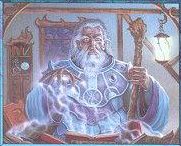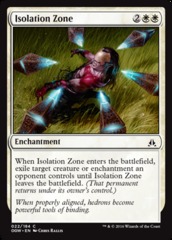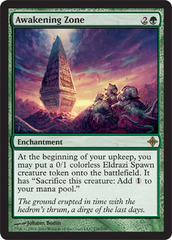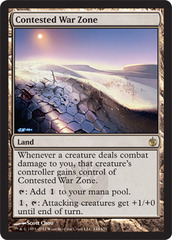The Mental Game of Magic – Playing in the Zone

What even is ‘playing in the zone’?
It is often referred to as focus, concentration or playing in the now. This is the total state of being that you need to enter when playing a match of Magic. However long your match lasts, you must be in the zone. To do this you will need to eliminate every single useless thought that might cause your mind to trip up.
The zone is an incredible place to be when playing a match of Magic, at any level, it cannot be understated how important it is.
Freeing up your ability to think

I’ve previously mentioned how it is beneficial to have as much practice with a deck as possible before going into a tournament. If you are well practiced then you know what to expect from each matchup: common play patterns, important cards to look out for and potential threats that could catch you out. The reason to practice is reduce the amount of things that you need to work out during any given match.
Playing in the zone is exactly the same mentally, it works for every deck and every tournament. Exercising your ability to play in the zone will free up the space in your brain and give you a clearer outlook on the game.
Have you ever said to yourself?
‘My opponent really should have blocked there.’
‘My sequencing last turn set me up horribly for this turn.’
‘I didn’t attack last turn, it feels bad if I now don’t block.’
‘I would be in such a good spot if I didn’t miss that trigger.’
Start by quitting. Don’t say these things, not now, not ever. Be honest with yourself. If you are thinking these things whilst playing your match, that is just as damaging as saying them out loud. These things seem harmless, like a natural thought that feels like part of playing the game. It’s just toxic and it’s holding you back.
Thinking or saying these things in a sarcastic or ironic way can be just as bad. You are internalising these things on at least some level by entertaining them. The sarcastic tone can make them seem trivial. This is not true, you must treat your thoughts with the respect they deserve.
We’ve established how you should avoid negative thinking during a match. What if you encounter a juicy spot for learning? You should not waste your time thinking about these either!
You don’t want to spend your mental energy on learning during a match because it won’t help you to win the game at hand. If a learning opportunity does arise, consider jotting it down and shelving it for later.
Pre-game Ritual

Okay, please don’t start sacrificing chickens before you play Magic. My pre-game ritual is simple; I unpack my deckbox, life pad and pen, and greet my opponent. After shuffling up and presenting my deck I don’t say anything unless it is part of the game. I don’t speak unless it is required by the rules of Magic or I think it will give me an edge in the game. Playing in the zone can come across as rude or unfriendly but it provides a huge benefit to your mental state and decision making.
Find a pre-game ritual that works for you. It’s important to note that it doesn’t have to look exactly the same every time. The pre-game should just be something comfortable that becomes familiar. For example if my opponent has no interest in greeting me or saying anything, no problem, I’ll just settle down to play my match.
How do I get better at playing in the zone?
Like any aspect of Magic the Gathering, it’s tough and it takes time. Something you can do is very similar to what I covered in my first article about variance. After you finish your match, you can track your focus by rating how ‘in the zone’ you felt in each match, potentially on a scale of 1-4. Consider how many toxic thoughts entered your mind, these can be written down as part of your post-game notes. It’s important to remember that your analysis of the match should be independent of the result. Even the most one sided games will likely have spots that you can improve from, mentally and technically.
Take time to reflect on your level of concentration. Simply ‘I wasn’t focused enough’ is not good enough. Be honest with yourself again and examine the reasons that you were not playing in the zone or perhaps fell out of the zone. Your reasons will be specific to you and must be addressed. This is why it takes time and effort to improve at playing in the zone.
Playing in the zone along with other aspects of the mental game require constant attention. For example, you may feel comfortable playing in the zone at a competitive level, frequently rating yourself ‘4’ for your level of focus. However, when you catch a big break and play on the world stage at the Pro Tour, things may be different. You may find you still need to work on things you had previously ‘mastered’.
What to aim for

This is a conversation I had with my opponent from a recent PPTQ. My opponent had just beaten me with mono red after I lost a close game and then lost a game where I mulliganed to four cards and the game was still close.
Opp (shaking head): Man, your lands were pretty unfortunate.
Me: What do you mean?
Opp: I mean… i’m sorry you got stuck on lands, that wasn’t fun
Me (at this point just realising I was stuck on lands for quite a few turns): Oh no it’s okay, thanks for the games and good luck with the rest.
Opp: Yeah you too
I smiled at my opponent and left the table, he seemed slightly distressed. It took me a few moments and then it dawned on me. My opponent was telling me my own ‘bad beat story’. We’d played, in my opinion quite an interesting and close match of Magic. My mind was reeling over the numerous amount of decisions I made. I hadn’t even paused to think about how many lands I had drawn in that game. The only thought I gave to the mulliganing portion of the game was ‘should I have kept my hands’.
Making positive steps in your mental game is hard but can lead to huge gains in other aspects of your play and your life.
I look forward to exploring some of the aspects I’ve touched on here in my future article and if there is anything you would especially like to see me cover, please feel free to get in touch in the comments below.





